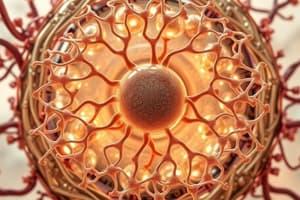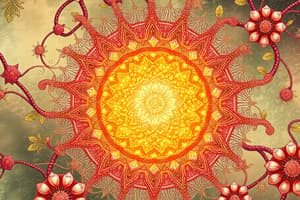Podcast
Questions and Answers
Who were the scientists involved in the development of cell theory?
Who were the scientists involved in the development of cell theory?
- Curie and Hawking
- Einstein and Newton
- Hooke and Galileo
- Schleiden and Schwann (correct)
Robert Hooke was the first scientist to observe living cells.
Robert Hooke was the first scientist to observe living cells.
False (B)
What do we call the basic building blocks of life?
What do we call the basic building blocks of life?
cells
The first cells observed were _____ in thin slices of _____.
The first cells observed were _____ in thin slices of _____.
What term did Hooke use to describe the dead cells he observed from cork?
What term did Hooke use to describe the dead cells he observed from cork?
All cells come from preexisting cells is a statement in the cell theory.
All cells come from preexisting cells is a statement in the cell theory.
Name one part of the cell that is responsible for making proteins.
Name one part of the cell that is responsible for making proteins.
Virchow's statement 'All cells come from cells' translates to Latin as 'cellula e ________.'
Virchow's statement 'All cells come from cells' translates to Latin as 'cellula e ________.'
Match the parts of the cell with their functions:
Match the parts of the cell with their functions:
Which scientist is credited with observing small living organisms he called 'animalcules'?
Which scientist is credited with observing small living organisms he called 'animalcules'?
Plant cells have a more flexible shape compared to animal cells.
Plant cells have a more flexible shape compared to animal cells.
What is the control center of the cell called?
What is the control center of the cell called?
Who were the scientists that contributed to the development of cell theory?
Who were the scientists that contributed to the development of cell theory?
All organisms are composed of cells according to the Unified Cell Theory.
All organisms are composed of cells according to the Unified Cell Theory.
What did Antonie van Leeuwenhoek observe and call tiny creatures?
What did Antonie van Leeuwenhoek observe and call tiny creatures?
Rudolf Virchow proposed that cells come from __________.
Rudolf Virchow proposed that cells come from __________.
Match the scientist with their contribution to cell theory:
Match the scientist with their contribution to cell theory:
What is a characteristic of the cell as per the cell theory?
What is a characteristic of the cell as per the cell theory?
Antonie van Leeuwenhoek was the first to develop the microscope.
Antonie van Leeuwenhoek was the first to develop the microscope.
What was the main drawback of Schwann's proposal concerning cells?
What was the main drawback of Schwann's proposal concerning cells?
Which scientist is associated with the discovery of cells?
Which scientist is associated with the discovery of cells?
Virchow proposed that all cells come from preexisting cells.
Virchow proposed that all cells come from preexisting cells.
Who used a drop of pond water to observe living cells?
Who used a drop of pond water to observe living cells?
______ are the building blocks of life.
______ are the building blocks of life.
Match the following scientists with their contributions to cell theory:
Match the following scientists with their contributions to cell theory:
What term did Robert Hooke use to describe the dead cells he observed?
What term did Robert Hooke use to describe the dead cells he observed?
Flashcards
What is a cell?
What is a cell?
The smallest unit of an organism that can be considered living.
What is the Cell Theory?
What is the Cell Theory?
The theory that all organisms are composed of cells and that cells are the basic units of life.
Who is Antonie van Leeuwenhoek?
Who is Antonie van Leeuwenhoek?
A Dutch scientist who was the first to perfect the microscope and observe protozoa, bacteria, and spermatozoa, calling them "animalcules."
Who are Schleiden and Schwann?
Who are Schleiden and Schwann?
Signup and view all the flashcards
Who is Rudolf Virchow?
Who is Rudolf Virchow?
Signup and view all the flashcards
What are cytologists?
What are cytologists?
Signup and view all the flashcards
What is cell division?
What is cell division?
Signup and view all the flashcards
What is cellular respiration?
What is cellular respiration?
Signup and view all the flashcards
What are cells?
What are cells?
Signup and view all the flashcards
Who discovered cells?
Who discovered cells?
Signup and view all the flashcards
What were the first cells observed?
What were the first cells observed?
Signup and view all the flashcards
Who observed living cells first?
Who observed living cells first?
Signup and view all the flashcards
What does the cell theory state?
What does the cell theory state?
Signup and view all the flashcards
Why are cells the basic unit of life?
Why are cells the basic unit of life?
Signup and view all the flashcards
What is the origin of the word "cell"?
What is the origin of the word "cell"?
Signup and view all the flashcards
Who discovered 'animalcules'?
Who discovered 'animalcules'?
Signup and view all the flashcards
Why did Robert Hooke call the compartments he observed 'cells'?
Why did Robert Hooke call the compartments he observed 'cells'?
Signup and view all the flashcards
What are the two main statements of the cell theory?
What are the two main statements of the cell theory?
Signup and view all the flashcards
What is the function of the cell membrane?
What is the function of the cell membrane?
Signup and view all the flashcards
What is the function of the nucleus?
What is the function of the nucleus?
Signup and view all the flashcards
What is the main function of ribosomes?
What is the main function of ribosomes?
Signup and view all the flashcards
What is the function of the Golgi apparatus?
What is the function of the Golgi apparatus?
Signup and view all the flashcards
What is a lysosome and why is it also nicknamed 'the suicidal bag'?
What is a lysosome and why is it also nicknamed 'the suicidal bag'?
Signup and view all the flashcards
Study Notes
Cell Theory Overview
- Cells are the fundamental building blocks of all living organisms.
- All organisms are made of cells.
- Cells are the basic units of life.
- Cells come from pre-existing cells.
- The cell theory was formulated in the mid-19th century.
Scientists and Their Contributions
- Robert Hooke observed dead cells in cork, coining the term "cellulae."
- Antonie van Leeuwenhoek observed living cells in pond water, calling them "animalcules." These included bacteria and protozoa.
- Schleiden and Schwann proposed a theory that all organisms are made of cells, and that cells are the basic units of life.
- Rudolf Virchow proposed that all cells come from pre-existing cells. This finalized the cell theory.
Cell Structure and Function
- Cell Membrane: Controls what enters and leaves the cell.
- Nucleus: Control center of the cell. Contains the genetic information.
- Chromosomes: Genetic information.
- Endoplasmic Reticulum (ER): Transport system in the cell.
- Ribosomes: Organelles that make proteins.
- Golgi Body: Packages proteins.
- Vacuole: Stores water and/or waste.
- Lysosome: Breaks down old cell parts.
- Mitochondria: Provide energy for the cell.
Animal vs. Plant Cells
- Animal cells are typically round or irregular.
- Plant cells are typically rectangular or cubic.
- Plant cells have a cell wall and chloroplasts.
- Animal cells have centrioles.
Microscopy
- The development of the microscope enabled early scientists to observe cells.
- Antonie van Leeuwenhoek was instrumental in improving microscopes to enable better views of cells.
Studying That Suits You
Use AI to generate personalized quizzes and flashcards to suit your learning preferences.




